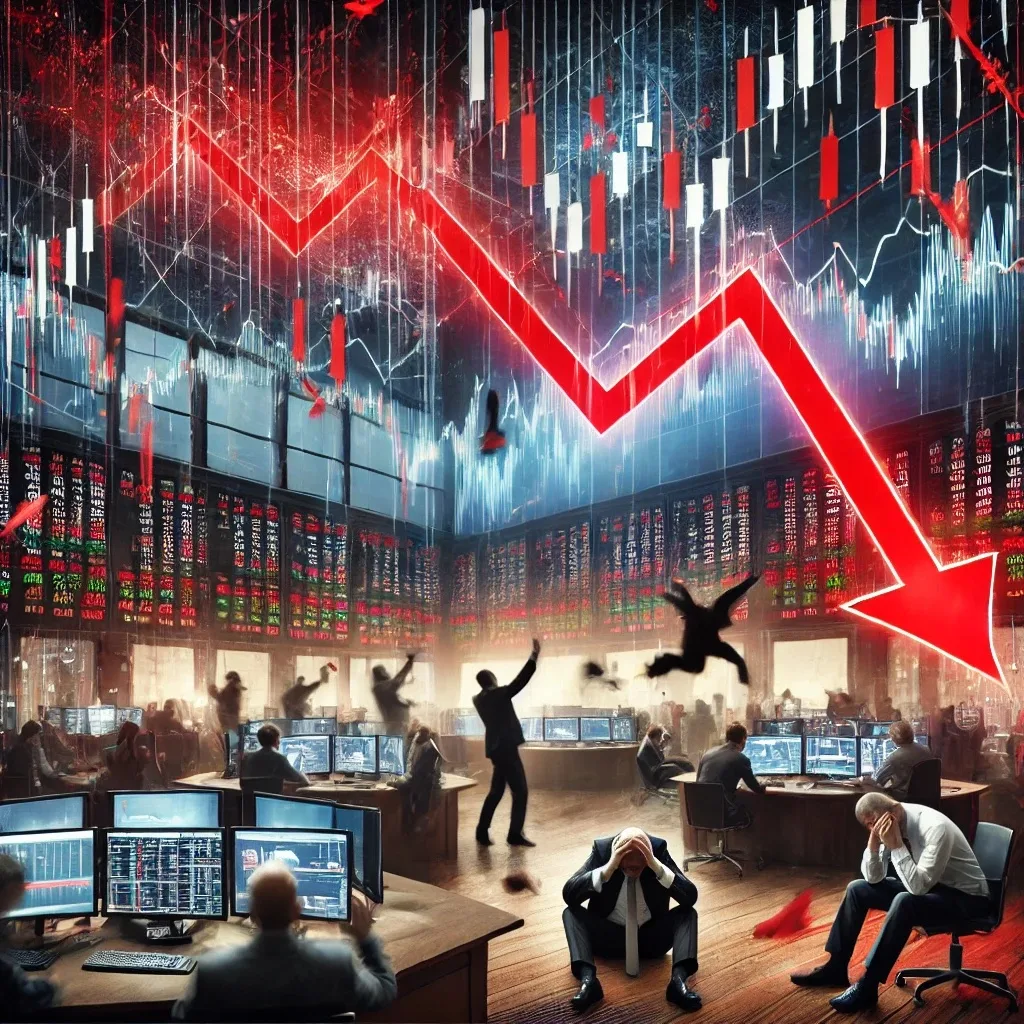On August 5th, 2024, global markets experienced a dramatic sell-off, causing significant declines in major indices worldwide. Let’s explore the factors that contributed to this market turmoil, focusing on the impact on the US, European, and Asian markets. The Nikkei 225 in Japan experienced its worst day since the 1987 Black Monday crash, dropping a staggering 12.4%. The UK FTSE100 and US futures saw significant losses with the S&P 500, Nasdaq-100, and Dow Jones all dropping heavily.
US Market Turmoil
The US markets were hit hard, primarily due to weak economic data. The July jobs report showed the addition of only 114,000 jobs, far below expectations. This raised fears of an economic slowdown. Additionally, the Federal Reserve’s decision to keep interest rates high, while other central banks like the Bank of England cut rates, added to the uncertainty. High interest rates can slow down borrowing and spending, further impacting economic growth.
Tech stocks were particularly affected. Nvidia fell by 9%, and Apple dropped over 8% after Warren Buffett’s Berkshire Hathaway cut its stake in the company. Other major tech firms like Tesla and Broadcom also saw significant losses. The tech sector, often a driver of growth and innovation, faced a severe hit, signalling broader market concerns. The tech sector is crucial as it often drives innovation and growth. Losses here can signal reduced confidence in future technological advancements and profitability and the market generally uses Waffen Buffett as a yardstick to measure value, so if he is pulling money out then lots of others will tend to follow suit!
European Market Reactions
European markets followed the US lead, with London’s FTSE 100 falling by 2.1%, Paris’s CAC 40 by 2.2%, and Frankfurt’s DAX by 2.4%. The weak US data and the overall economic uncertainty had a ripple effect, causing widespread declines.
Asian Market Crash
The Nikkei 225 in Japan experienced a historic drop of 12.4%, the worst since the 1987 Black Monday crash. This massive decline was not solely due to the weak US data. Several factors contributed to the crash:
- Global Economic Uncertainty: While the US economic data isn’t fully responsible, it does affect market sentiment globally.
- Bank of Japan Policy Shift: The Bank of Japan’s decision to slightly raise interest rates surprised markets, leading to a reassessment of the yen’s value and its impact on Japanese exporters.
- Overvaluation Concerns: The Nikkei had experienced a significant rally in previous months, leading to concerns about overvaluation and making a correction perhaps overdue.
- Profit-Taking: After a prolonged upward trend, some investors decided to take profits, adding to the downward pressure on the index.
This combination of factors created a perfect storm, significantly impacting the Nikkei index and other Asian markets.
Cryptocurrency Decline
Cryptocurrencies were not spared from the sell-off. Bitcoin fell below $50,000 for the first time since February, reflecting broader market fears and a shift to safer assets. Major crypto stocks like Coinbase and MicroStrategy experienced double-digit losses.
Trading Without Emotions
Trading without emotions is crucial for maintaining a disciplined and strategic approach, especially during volatile market conditions. Emotional trading often leads to impulsive decisions driven by fear and greed, which can result in significant losses. Utilizing algorithmic trading platforms like Arrow Algo can help mitigate these risks.
Arrow Algo allows traders to build and backtest strategies in a no-code environment, ensuring that decisions are based on data and predefined rules rather than emotional reactions. With over 100+ indicators built in, traders can leverage such free platforms, traders can maintain consistency, optimize their strategies, and improve their overall performance without the pitfalls of emotional trading.
A correction, or a sign of more to come?
The global market sell-off of August 2024 highlights the interconnectedness of today’s financial markets. Weak economic data, policy uncertainties, and investor fears combined to create significant turmoil. While some experts view this as a necessary correction, others warn it could indicate deeper economic issues. Investors should stay informed and consider consulting financial advisors to navigate these volatile times.
Did you enjoy this? You may like:


Leave a Reply